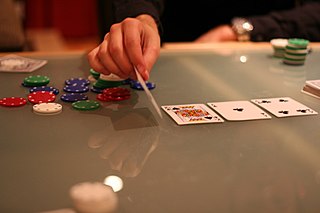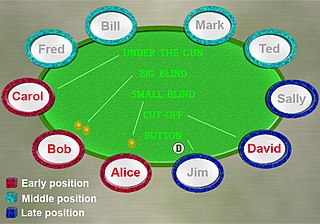Five-card draw is a poker variant that is considered the simplest variant of poker, and is the basis for video poker. As a result, it is often the first variant learned by new players. It is commonly played in home games but rarely played in casino and tournament play. The variant is also offered by some online venues, although it is not as popular as other variants such as Seven-card stud and Texas hold 'em.
Five-card stud is the earliest form of the card game stud poker, originating during the American Civil War, but is less commonly played today than many other more popular poker games. It is still a popular game in parts of the world, especially in Finland where a specific variant of five-card stud called Sökö is played. The word sökö is also used for checking in Finland.
Seven-card stud, also known as Seven-Toed Pete or Down-The-River is a variant of stud poker. Until the recent increase in popularity of Texas hold 'em, seven-card stud was the most widely played poker variant in home games across the United States, and in casinos in the eastern part of the country. Two to eight players is common, though eight may require special rules for the last cards dealt if no players fold. With experienced players who fold often, even playing with nine players is possible.

Texas hold 'em is a variation of the card game of poker. Two cards, known as hole cards, are dealt face down to each player, and then five community cards are dealt face up in three stages. The stages consist of a series of three cards, later an additional single card, and a final card. Each player seeks the best five card poker hand from any combination of the seven cards of the five community cards and their two hole cards. Players have betting options to check, call, raise, or fold. Rounds of betting take place before the flop is dealt and after each subsequent deal. The player who has the best hand and has not folded by the end of all betting rounds wins all of the money bet for the hand, known as the pot.

Three-card brag is a 16th-century British card game, and the British national representative of the vying or "bluffing" family of gambling games. Brag is a direct descendant of the Elizabethan game of Primero and one of the several ancestors to poker, just varying in betting style and hand rankings.
Razz is a form of stud poker that is normally played for ace-to-five low. It is one of the oldest forms of poker, and has been played since the very start of the 20th Century. It emerged around the time people started using the 52-card deck instead of 20 for poker.
Four Card Poker is a casino card game similar to Three Card Poker, invented by Roger Snow and owned by Shuffle Master.
Texas Hold'em Bonus Poker is a casino table game, owned and licensed by Mikohn Gaming/Progressive Gaming International Corporation. The game is based on traditional multi-player Texas Hold'em poker, but differs in that there is no bet after the river card.

Napoleon or Nap is a straightforward trick-taking game in which players receive five cards each; whoever bids the highest number of tricks chooses trumps and tries to win at least their bidden number of tricks. It is a simplified relative of Euchre, and has many variations throughout Northern Europe. The game has been popular in England for 200 years and has given the language a slang expression, "to go nap", meaning to take five of anything. It may be less popular now than it was, but it is still played in some parts of southern England and in Strathclyde. Despite its title and allusions, it is not recorded before the last third of the nineteenth century, and may have been first named after Napoleon III.
Teen patti is a gambling card game that originated in the Indian subcontinent and is popular throughout South Asia. It originated in the English game of three-card brag, with influences from poker. It is also called flush or flash in some areas.
Acey Deucey, also known as In-Between, SheetsBetween the Sheets or Maverick, is a simple card game that involves betting.
Guts is a comparing card game, or family of card games, related to poker. Guts is a gambling game involving a series of deals of 2, 3, or 4 cards. Hand are ranked similarly to hands in poker. The betting during each deal is simple : all players decide whether they are "in" or "out", and announce this at the same time. Each deal has its own showdown, after which the losers match or increase the pot, which grows rapidly. A round of the game ends when only one person stays in and wins the pot.
The following is a glossary of poker terms used in the card game of poker. It supplements the glossary of card game terms. Besides the terms listed here, there are thousands of common and uncommon poker slang terms. This is not intended to be a formal dictionary; precise usage details and multiple closely related senses are omitted here in favor of concise treatment of the basics.
Draw poker is any poker variant in which each player is dealt a complete hand before the first betting round, and then develops the hand for later rounds by replacing, or "drawing", cards.

The following is a glossary of terms used in card games. Besides the terms listed here, there are thousands of common and uncommon slang terms. This list does not encompass terms that are specific to one game.
Mississippi stud is a casino table game based on poker introduced by Scientific Games. It has been identified by The Motley Fool as part of a new generation of table games designed to appeal to younger players by offering easier-to-learn strategies while having a lower house advantage than traditional blackjack.






